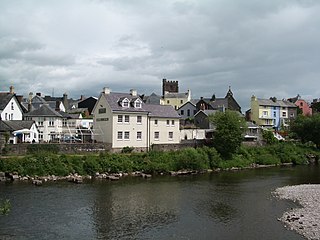Related Research Articles

Brecon, archaically known as Brecknock, is a market town in Powys, mid Wales. In 1841, it had a population of 5,701. The population in 2001 was 7,901, increasing to 8,250 at the 2011 census. Historically it was the county town of Brecknockshire (Breconshire); although its role as such was eclipsed with the formation of the County of Powys, it remains an important local centre. Brecon is the third-largest town in Powys, after Newtown and Ystradgynlais. It lies north of the Brecon Beacons mountain range, but is just within the Brecon Beacons National Park.

Brecknockshire, also known as the County of Brecknock, Breconshire, or the County of Brecon is one of thirteen historic counties of Wales, and a former administrative county. Named after its county town of Brecon, the county is mountainous and primarily rural.

The Bishop of Swansea and Brecon is the Ordinary of the Church in Wales Diocese of Swansea and Brecon.

William Edwards was a Welsh Methodist minister who also practised as a stonemason, architect and bridge engineer.

The Diocese of Swansea and Brecon was established as a Diocese of the Church in Wales in 1923 with Brecon Priory as the cathedral. The area of the diocese had formerly been the Archdeaconry of Brecon within the Diocese of St Davids. The diocese has a border with each of the other five Welsh dioceses, as well as with the English Diocese of Hereford.

Llangorse Lake is the largest natural lake in Mid and South Wales, and is situated in the Brecon Beacons National Park, near the town of Brecon and the village of Llangors.
Gruffudd ap Rhys was Archdeacon of Brecon from 1345 until 1366.

The Cambrian Archaeological Association was founded in 1846 to examine, preserve and illustrate the ancient monuments and remains of the history, language, manners, customs, arts and industries of Wales and the Welsh Marches and to educate the public in such matters. The association's activities include sponsoring lectures, field visits, and study tours; as well as publishing its journal, Archaeologia Cambrensis, and monographs. It also provides grants to support research and publications.

Llangenny is a village in the Brecon Beacons National Park, Powys, Wales. It is in the lower reaches of the Grwyne Fawr. The Vale of Grwyney community consists of Glangrwyney, Llanbedr, and Llangenny.
George Constantine was a British priest who was an early Protestant and evangelical reformer.
Anthony Edward Pierce was the Bishop of Swansea and Brecon in the Church in Wales from 1999 to 2008.
The archdeacon of Gower is the priest in charge of the archdeaconry of Gower, an administrative division of the Church in Wales Diocese of Swansea and Brecon. The archdeaconry comprises the six deaneries of Clyne, Cwmtawe, Gower, Llwchwr, Penderi and Swansea.
The Archdeacon of Brecon is a senior ecclesiastical officer in the Church in Wales Diocese of Swansea and Brecon. The archdeacon is the senior priest with responsibility over the area of the archdeaconry of Brecon, which comprises the five rural deaneries of Brecon, Builth, Crickhowell, Hay and Maelienydd.

William Latham Bevan was a Welsh churchman, archdeacon of Brecon from 1875.
Jonathan Byron Davies is a Welsh Anglican priest. He has served as the Vicar of Llwynderw in the Diocese of Swansea and Brecon, Church in Wales since September 2015, and as the Archdeacon of Gower since September 2016.
Thomas Elwyn Griffiths was a Welsh Anglican priest.
Owain William Jones was a Welsh Anglican priest.
Richard William Payne Davies was a Welsh Anglican priest in the 19th century, the archdeacon of Brecon from 1859 to 1875..
Richard Davies (c.1777–1859) was a Welsh Anglican priest in the 19th century.
Walter Jones was a Welsh Anglican priest in the mid 16th Century.
References
- ↑ "The Things which Belong Unto Our Peace: a Sermon Preached August 17, 1795" By Edward Edwards (Archdeacon of Brecon.): Brecknock; W. & G. North;1797
- ↑ National Archives
- ↑ "Brycheiniog – Vol. 22 1986–1987 The Archdeaconry of Brecon". Welsh Journals Online. Retrieved 11 April 2020.